-
 Bitcoin
Bitcoin $83,692.4478
-1.61% -
 Ethereum
Ethereum $1,878.9152
-1.65% -
 Tether USDt
Tether USDt $0.9996
-0.01% -
 XRP
XRP $2.1251
-4.97% -
 BNB
BNB $607.7707
-3.39% -
 Solana
Solana $126.5286
-4.15% -
 USDC
USDC $1.0000
0.00% -
 Dogecoin
Dogecoin $0.1747
-4.01% -
 Cardano
Cardano $0.6830
-2.64% -
 TRON
TRON $0.2340
1.72% -
 Toncoin
Toncoin $3.7249
-6.77% -
 Chainlink
Chainlink $13.9350
-3.52% -
 UNUS SED LEO
UNUS SED LEO $9.7132
-0.84% -
 Avalanche
Avalanche $19.9989
-3.32% -
 Stellar
Stellar $0.2685
-2.67% -
 Sui
Sui $2.4435
-5.51% -
 Shiba Inu
Shiba Inu $0.0...01285
-2.92% -
 Hedera
Hedera $0.1747
-4.56% -
 Litecoin
Litecoin $86.3363
-2.50% -
 Polkadot
Polkadot $4.1476
-3.75% -
 MANTRA
MANTRA $6.2288
-2.74% -
 Bitcoin Cash
Bitcoin Cash $307.5887
-1.92% -
 Pi
Pi $0.8304
-0.64% -
 Bitget Token
Bitget Token $4.6694
-3.21% -
 Dai
Dai $1.0001
0.01% -
 Ethena USDe
Ethena USDe $0.9994
0.06% -
 Hyperliquid
Hyperliquid $12.7969
-5.74% -
 Monero
Monero $217.1874
-2.02% -
 Uniswap
Uniswap $6.1363
-4.29% -
 Aptos
Aptos $5.4725
-2.79%
Does Ethereum wallet support cross-chain transfer function?
Ethereum wallets lack native cross-chain transfer functionality; users must utilize bridging solutions like centralized exchanges or decentralized bridges (e.g., Wormhole) to move assets between Ethereum and other blockchains, each with varying security and speed considerations.
Mar 26, 2025 at 05:22 am

Does Ethereum Wallet Support Cross-Chain Transfer Function?
Ethereum, a leading blockchain platform, doesn't inherently support direct cross-chain transfers in the same way some newer protocols do. A standard Ethereum wallet, therefore, doesn't have a built-in function for seamless transfers to other blockchains like Solana, Binance Smart Chain (BSC), or Polygon. This limitation stems from the fundamental differences in how each blockchain operates and secures transactions. Instead, users rely on bridging solutions to facilitate these transfers.
Understanding the limitations is crucial. Ethereum's security and decentralized nature are partly responsible for this lack of direct cross-chain functionality. Building a truly secure and decentralized cross-chain transfer mechanism is a complex undertaking, requiring careful consideration of various factors like consensus mechanisms and security vulnerabilities.
What are the available methods for cross-chain transfers from an Ethereum wallet? Several methods allow you to move your crypto assets between Ethereum and other blockchains. These methods often involve intermediary protocols or services acting as bridges. Understanding the nuances of each approach is key to choosing the best option for your needs. The choice depends on factors like speed, security, and fees.
Methods for Cross-Chain Transfers from Ethereum:
- Centralized Exchanges (CEXs): Many popular exchanges like Coinbase, Binance, and Kraken support various cryptocurrencies. You can transfer your ETH to the exchange, then withdraw it as a different cryptocurrency on another blockchain. This method is generally convenient but involves entrusting your funds to a third party.
- Decentralized Bridges: Decentralized bridges are protocols that allow users to lock their assets on one blockchain and mint equivalent tokens on another. Examples include Wormhole, RenBridge, and Chainlink's CCIP. These offer a more decentralized approach compared to CEXs but may involve higher fees or longer transaction times.
- Wrapped Tokens: Wrapped tokens represent assets from one blockchain on another. For instance, wETH (wrapped Ether) represents ETH on other networks like Polygon. You can transfer wETH to a different blockchain and then unwrap it back to ETH. The process requires understanding the specific wrapping and unwrapping mechanisms.
- Atomic Swaps: Atomic swaps enable the direct exchange of cryptocurrencies between different blockchains without relying on intermediaries. This is a more complex method, requiring advanced technical knowledge and is not yet widely adopted for everyday users.
Understanding the Process of Using Bridges:
Let's break down the general process of using a decentralized bridge, taking Wormhole as an example. The steps may vary slightly depending on the specific bridge:
- Connect Your Ethereum Wallet: You'll need to connect your Ethereum wallet (e.g., MetaMask) to the bridge's interface.
- Select the Tokens and Chains: Choose the token you want to transfer (e.g., ETH) and the destination blockchain (e.g., Solana).
- Approve the Transaction: You'll need to approve the transaction on your Ethereum wallet, authorizing the bridge to access and lock your funds.
- Initiate the Transfer: Once approved, initiate the transfer process. This involves sending your ETH to the bridge's designated address.
- Receive Tokens on the Destination Chain: After a certain lock-up period (which varies by bridge), you'll receive the equivalent amount of tokens on the target blockchain.
Security Considerations:
Cross-chain transfers, especially those involving decentralized bridges, introduce additional security risks. It's crucial to:
- Verify the Bridge's Reputation: Choose well-established and audited bridges with a proven track record.
- Use Reputable Wallets: Use secure and well-known wallets to minimize the risk of phishing or malicious software.
- Understand the Fees: Be aware of the transaction fees associated with both the initial transfer and the receiving chain. These fees can vary significantly.
- Be Aware of Smart Contract Risks: Decentralized bridges rely on smart contracts, and vulnerabilities in these contracts can lead to loss of funds.
Frequently Asked Questions:
Q: Is it safe to use decentralized bridges for cross-chain transfers?
A: Decentralized bridges offer a higher level of decentralization compared to CEXs, but they still carry risks. Thoroughly research and vet any bridge before using it. Audits and community reputation are crucial factors to consider.
Q: What are the fees associated with cross-chain transfers?
A: Fees vary significantly depending on the method used (CEX, decentralized bridge, etc.), the blockchain networks involved, and network congestion. Gas fees on Ethereum can be substantial.
Q: Can I transfer all ERC-20 tokens using a bridge?
A: Not all bridges support every ERC-20 token. The supported tokens will vary depending on the specific bridge's functionality and integrations. Check the bridge's documentation for a list of supported tokens.
Q: What happens if a bridge is compromised?
A: If a bridge is compromised, the risk of losing your funds is high. Choose bridges with a strong security track record and actively monitor for any security advisories.
Q: Are there any alternatives to using bridges for cross-chain transfers?
A: Using a centralized exchange is an alternative, but it requires trusting a third-party custodian with your funds. Atomic swaps are another option, but they are complex and not widely used.
Disclaimer:info@kdj.com
The information provided is not trading advice. kdj.com does not assume any responsibility for any investments made based on the information provided in this article. Cryptocurrencies are highly volatile and it is highly recommended that you invest with caution after thorough research!
If you believe that the content used on this website infringes your copyright, please contact us immediately (info@kdj.com) and we will delete it promptly.
- Bitcoin (BTC), Ethereum (ETH), and XRP (XRP) prices fall as demand drops, ETF outflows rise, and whales shift to gold and stablecoins.
- 2025-03-29 16:50:12
- The Ethereum Crossroads
- 2025-03-29 16:50:12
- With a Series of Negative News, KYC Controversy, Network Issues, and Updates
- 2025-03-29 16:45:12
- The Meme Coin Frenzy: A Wake-Up Call for the Cryptocurrency Market
- 2025-03-29 16:45:12
- Trump Is Shaking Things Up in Crypto Again! This Time, He's Handing Out Pardons
- 2025-03-29 16:40:12
- Jake Claver, a well-known business leader and financial strategist, made a statement on X regarding major banks testing XRP for real-time payments.
- 2025-03-29 16:40:12
Related knowledge

How to easily generate a Bitcoin payment address
Mar 29,2025 at 10:49am
Generating a Bitcoin payment address might seem daunting, but it's actually quite straightforward. This process is crucial for receiving Bitcoin, as each transaction requires a unique address. Understanding how this works is fundamental to using Bitcoin effectively. This guide will walk you through the simple steps, regardless of your technical experti...
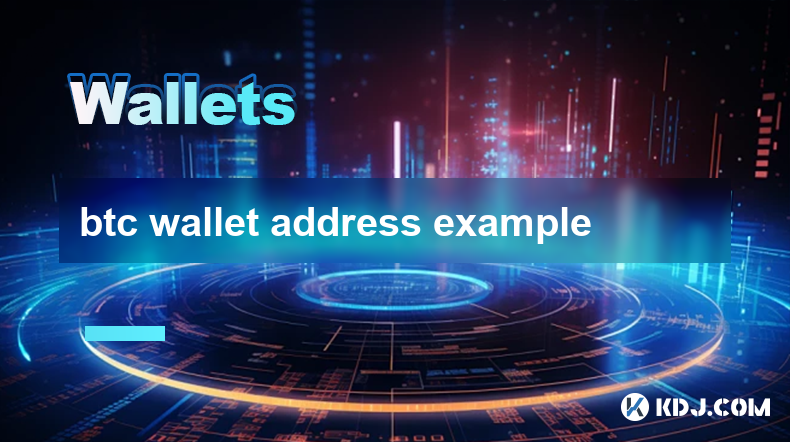
btc wallet address example
Mar 29,2025 at 04:35am
: A Deep Dive into Bitcoin AddressesBitcoin, the pioneering cryptocurrency, relies on a system of digital wallets and addresses for secure transaction management. Understanding Bitcoin wallet addresses is crucial for anyone interacting with the BTC network. This article will explore various aspects of BTC wallet addresses, providing examples and clarify...
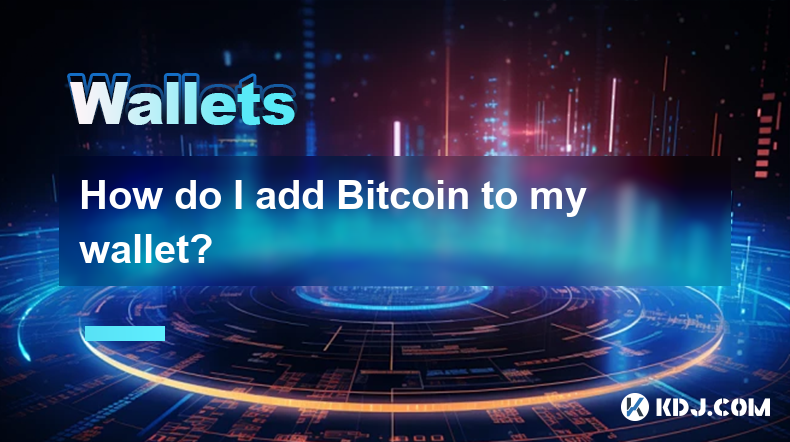
How do I add Bitcoin to my wallet?
Mar 29,2025 at 07:28am
Understanding Bitcoin Wallets and AddressesBefore adding Bitcoin to your wallet, it's crucial to understand what a Bitcoin wallet actually is. It's not a physical container, but rather a software program or hardware device that stores your private keys. These private keys are essential for accessing and controlling your Bitcoin. Your wallet also genera...
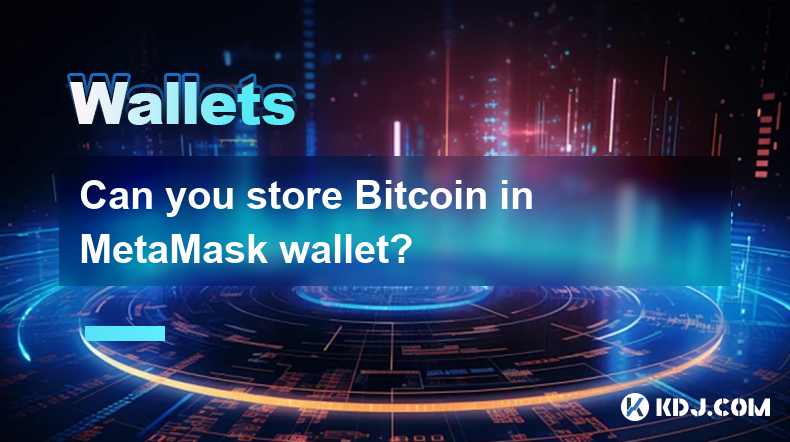
Can you store Bitcoin in MetaMask wallet?
Mar 29,2025 at 05:00am
Understanding MetaMask and Bitcoin CompatibilityMetaMask is a popular browser extension and mobile app that functions as a cryptocurrency wallet. It's primarily known for its interaction with Ethereum and other Ethereum Virtual Machine (EVM)-compatible blockchains. While MetaMask doesn't directly support Bitcoin storage in the same way it does for ETH ...
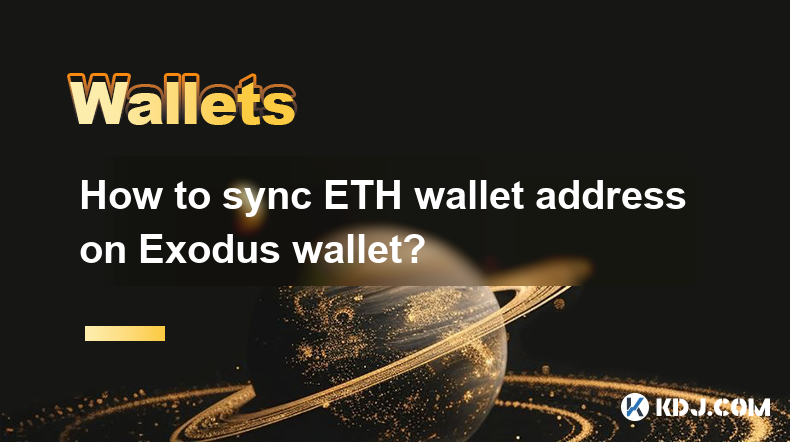
How to sync ETH wallet address on Exodus wallet?
Mar 29,2025 at 02:00am
Understanding Exodus Wallet and Ethereum IntegrationExodus is a popular multi-cryptocurrency wallet known for its user-friendly interface. It supports a wide range of cryptocurrencies, including Ethereum (ETH). Syncing your ETH wallet address within Exodus simply means ensuring your wallet is connected to the Ethereum blockchain and can display your ET...
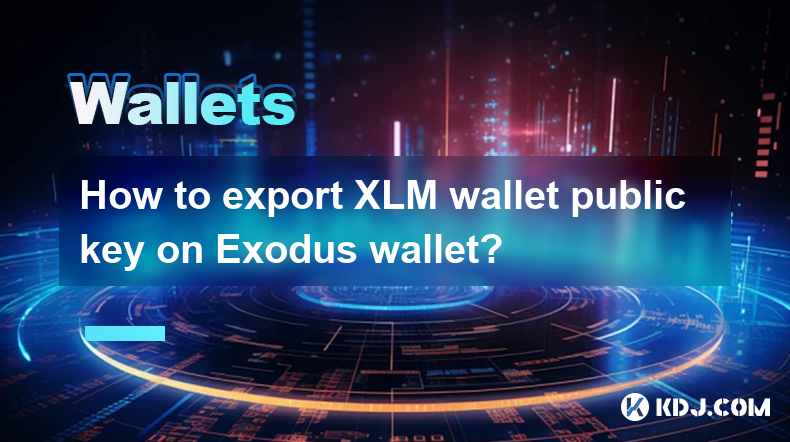
How to export XLM wallet public key on Exodus wallet?
Mar 29,2025 at 08:36am
Understanding Public Keys and Their ImportanceA public key is a cryptographic key that is used to receive cryptocurrency. Unlike your private key, which should be kept absolutely secret, your public key can be shared freely. It's essentially your Stellar Lumens (XLM) address, allowing others to send you funds. Exodus, being a multi-currency wallet, han...

How to easily generate a Bitcoin payment address
Mar 29,2025 at 10:49am
Generating a Bitcoin payment address might seem daunting, but it's actually quite straightforward. This process is crucial for receiving Bitcoin, as each transaction requires a unique address. Understanding how this works is fundamental to using Bitcoin effectively. This guide will walk you through the simple steps, regardless of your technical experti...

btc wallet address example
Mar 29,2025 at 04:35am
: A Deep Dive into Bitcoin AddressesBitcoin, the pioneering cryptocurrency, relies on a system of digital wallets and addresses for secure transaction management. Understanding Bitcoin wallet addresses is crucial for anyone interacting with the BTC network. This article will explore various aspects of BTC wallet addresses, providing examples and clarify...

How do I add Bitcoin to my wallet?
Mar 29,2025 at 07:28am
Understanding Bitcoin Wallets and AddressesBefore adding Bitcoin to your wallet, it's crucial to understand what a Bitcoin wallet actually is. It's not a physical container, but rather a software program or hardware device that stores your private keys. These private keys are essential for accessing and controlling your Bitcoin. Your wallet also genera...

Can you store Bitcoin in MetaMask wallet?
Mar 29,2025 at 05:00am
Understanding MetaMask and Bitcoin CompatibilityMetaMask is a popular browser extension and mobile app that functions as a cryptocurrency wallet. It's primarily known for its interaction with Ethereum and other Ethereum Virtual Machine (EVM)-compatible blockchains. While MetaMask doesn't directly support Bitcoin storage in the same way it does for ETH ...

How to sync ETH wallet address on Exodus wallet?
Mar 29,2025 at 02:00am
Understanding Exodus Wallet and Ethereum IntegrationExodus is a popular multi-cryptocurrency wallet known for its user-friendly interface. It supports a wide range of cryptocurrencies, including Ethereum (ETH). Syncing your ETH wallet address within Exodus simply means ensuring your wallet is connected to the Ethereum blockchain and can display your ET...

How to export XLM wallet public key on Exodus wallet?
Mar 29,2025 at 08:36am
Understanding Public Keys and Their ImportanceA public key is a cryptographic key that is used to receive cryptocurrency. Unlike your private key, which should be kept absolutely secret, your public key can be shared freely. It's essentially your Stellar Lumens (XLM) address, allowing others to send you funds. Exodus, being a multi-currency wallet, han...
See all articles






















































































